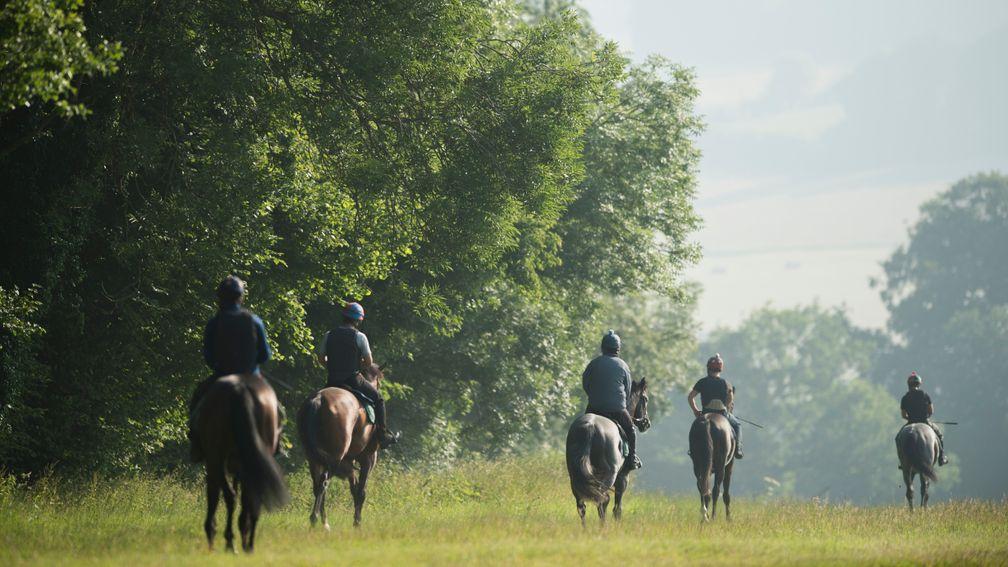Coronavirus: surveillance system launched to track Covid-19 cases in racing

A surveillance system to identify potential flare-ups of Covid-19 within the racing community is to be launched by the BHA as part of strict health and hygiene protocols put in place to allow the sport to restart on Monday.
The sport's governing body is relying on a layered approach to combat and mitigate any potential spread of the coronavirus by racing restarting, as well as emphasising participants and racecourse attendees take responsibility for maintaining social distancing and comply with sanitation measures.
In addition to a mandatory online education course, health questionnaires, temperature checks and the use of face coverings, the BHA's chief medical officer Dr Jerry Hill revealed further data would be gathered and monitored to specifically keep tabs on cases of Covid-19 within racing.
He said on Sunday: "We're going to launch a surveillance programme so we can map in an anonymous fashion the caseload of Covid-19 in our industry. With government we know we can map it by region and by lower tier local authority area, which allows us to identify local rates around yards and racecourses, but that's not racing specific.
"What we need is a racing-specific database so we can say specifically that in this geographical area – and we're doing it by partial postcode system – we've seen a little increase in numbers in racing. That allows us to then link up with our colleagues at Public Health England and have conversations about what are you now going to do about that and how are you going to help manage that.
"We will be looking at small geographical areas. We won't know exactly who and where it has taken place, but we will know their role, the area and some other things around age and ethnicity, but we will not be able to identify the individual. We then flag this up to Public Health England and they will have the precise details.
"Our role is to alert Public Health England and have a dialogue in order that we can together decide what an appropriate intervention there can be to deal with that outbreak."
He added: "One of the questions everyone loves to ask is what are you going to do about testing. And testing, in terms of laboratory testing, comes into that surveillance programme as we recognise we get greater value from target testing rather than blanket testing."
A spike in positive cases for the disease in racing will not necessarily lead to an area or specific yard being locked down, according to Brant Dunshea, the BHA's chief regulatory officer, but rather allow the sport to keep on top of cases and in conversation with Public Health England.
He said: "The surveillance programme is such that it allows us to monitor what's going on at a local level and in terms of our response it will be relevant to the particular circumstances.
The Racing Post newspaper will be back in shops to mark the return of British racing on Monday, June 1! With extensive coverage of all the racing, interviews with the biggest names, tipping from our renowned experts, writing from the likes of Alastair Down and all the cards and form, it's your unmissable guide to all the action. Pick up your copy on Monday.
"We wouldn't be immediately locking down a particular facility or trainer's activities. Jerry would be engaging with Public Health England getting an understanding of what the issue is and then there would be a collaborative approach in how we respond."
Alongside the screening and hygiene measures being implemented, Hill and BHA chief executive Nick Rust emphasised the importance of individuals adhering to the rules and regulations to prevent transmission of the virus.
Hill said: "It's down to us as individuals. If you see one of your colleagues on a racecourse who is drifting in the wrong direction in terms of a two-metre [social] distance it's down to us to remind them and pull them up while being mindful of our own responsibilities. If we do that and work together then I think we stand a good chance of reducing transmission on the racecourse."
Rust added: "Employers have a responsibility in individual circumstances. Even with the background surveillance individuals need to be excluded from the working area. None of our protocols supersede the government guidelines, they are in addition to what is needed."
Read more:
Rust very confident heightened health measures will protect attendees on track
New health and safety protocols well received by trainers and jockeys
Return of racing: three horses to note at Newcastle on Monday
Punting dos and don'ts for when British racing resumes next week
Published on inNews
Last updated
- Join Racing Post Members' Club for the very best in racing journalism - including Patrick Mullins' unmissable trip to see Gordon Elliott
- Racing Post Members' Club: 50% off your first three months
- Join the same team as Ryan Moore, Harry Cobden and other top jockeys with 50% off Racing Post Members' Club
- 'It’s really exciting we can connect Wentworth's story to Stubbs' - last chance to catch master painter's homecoming
- The jumps season is getting into full swing - and now is the perfect time to join Racing Post Members' Club with 50% off
- Join Racing Post Members' Club for the very best in racing journalism - including Patrick Mullins' unmissable trip to see Gordon Elliott
- Racing Post Members' Club: 50% off your first three months
- Join the same team as Ryan Moore, Harry Cobden and other top jockeys with 50% off Racing Post Members' Club
- 'It’s really exciting we can connect Wentworth's story to Stubbs' - last chance to catch master painter's homecoming
- The jumps season is getting into full swing - and now is the perfect time to join Racing Post Members' Club with 50% off